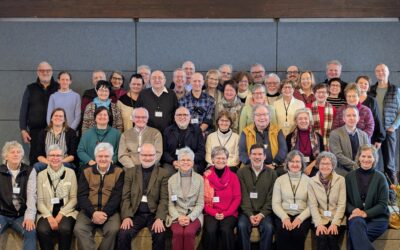 In paragraph 87 of his Apostolic Exhortation Ecclesia in Africa, John Paul II describes the process of inculturation as a “path to holiness” just as he had already done when he pointed the bishops of Kenya in this direction in 1980. In May 1992 Chiara Lubich began a Centre for Inculturation according to the spirituality of unity, in Nairobi, Kenya. There she intuited what “an overpowering weapon” was contained in “making himself one” of St. Paul (see 1Cor. 9:22). Chiara explained: “We can’t enter into the soul of a brother in order to comprehend and understand him. . . if our own spirit is filled with an apprehension, a judgement. (. . .) “Making yourself one means placing yourself in front of everyone in the position of a learner, because we really do have something to learn. It means cutting completely the roots of your own culture and entering into the culture of the other in order to understand it and letting it express itself, until you have finally understood it from within you. Then, once you’ve comprehended it, then, ye, you may begin a respectful dialogue with him and also pass on the evangelical message through the riches that he already possesses.” In sostanza, sintetizza Chiara nel 2000 visitando la cittadella di Fontem (Cameroon), “è l’amore che deve guidarci nell’inculturazione, così che agisca lo Spirito Santo”. Therefore, inculturation as Chiara understands it is an “exchange of gifts”: “Like this, the brother has first given to us; then we follow suit. . . and upon this ‘living’ something that is between us we, in act of pure service, can gently, with love and within the limits of discretion implant those aspects of the evangelical truth that we bring, and that bring fulfillment and completion to what our neighbor already believes, what he or she has been awaiting, coveting, longing for. And these aspects then draw along with them the entire truth.” Several editions of this course on inculturation have taken place over the past 21 years on a bi-annual basis. Each of them has focused on a single cultural or existential aspect of life: privat property and work; the concept of God; the human person and the community; reconciliation; suffering, illness and death; education; communications; the sacred in the traditional religiosity of Sub-Saharan Africa. This year (May 10-13) the focus will be on “the human person in African culture”. This topic will be examined from three perspectives: traditional African culture, Holy Scripture and the Magisterium of the Church in the light of the charism of unity. Source: excerpts from Chiara Lubich in the Presentation of the volume “Il senso del sacro nell’Africa subsahariana” Opus Mariae, Nairobi, Centre for Inculturation, 2012, pp.5-7.
In paragraph 87 of his Apostolic Exhortation Ecclesia in Africa, John Paul II describes the process of inculturation as a “path to holiness” just as he had already done when he pointed the bishops of Kenya in this direction in 1980. In May 1992 Chiara Lubich began a Centre for Inculturation according to the spirituality of unity, in Nairobi, Kenya. There she intuited what “an overpowering weapon” was contained in “making himself one” of St. Paul (see 1Cor. 9:22). Chiara explained: “We can’t enter into the soul of a brother in order to comprehend and understand him. . . if our own spirit is filled with an apprehension, a judgement. (. . .) “Making yourself one means placing yourself in front of everyone in the position of a learner, because we really do have something to learn. It means cutting completely the roots of your own culture and entering into the culture of the other in order to understand it and letting it express itself, until you have finally understood it from within you. Then, once you’ve comprehended it, then, ye, you may begin a respectful dialogue with him and also pass on the evangelical message through the riches that he already possesses.” In sostanza, sintetizza Chiara nel 2000 visitando la cittadella di Fontem (Cameroon), “è l’amore che deve guidarci nell’inculturazione, così che agisca lo Spirito Santo”. Therefore, inculturation as Chiara understands it is an “exchange of gifts”: “Like this, the brother has first given to us; then we follow suit. . . and upon this ‘living’ something that is between us we, in act of pure service, can gently, with love and within the limits of discretion implant those aspects of the evangelical truth that we bring, and that bring fulfillment and completion to what our neighbor already believes, what he or she has been awaiting, coveting, longing for. And these aspects then draw along with them the entire truth.” Several editions of this course on inculturation have taken place over the past 21 years on a bi-annual basis. Each of them has focused on a single cultural or existential aspect of life: privat property and work; the concept of God; the human person and the community; reconciliation; suffering, illness and death; education; communications; the sacred in the traditional religiosity of Sub-Saharan Africa. This year (May 10-13) the focus will be on “the human person in African culture”. This topic will be examined from three perspectives: traditional African culture, Holy Scripture and the Magisterium of the Church in the light of the charism of unity. Source: excerpts from Chiara Lubich in the Presentation of the volume “Il senso del sacro nell’Africa subsahariana” Opus Mariae, Nairobi, Centre for Inculturation, 2012, pp.5-7.
Closeness creates a real sense of family
Closeness creates a real sense of family




0 Comments